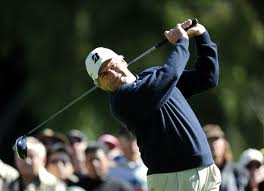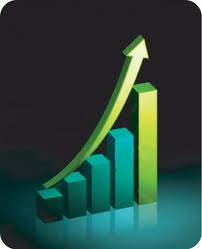Like some of you, I always enjoy watching the final round of a good golf tournament on a Sunday afternoon, particularly if it’s a close race to the finish, or if there is someone I like to follow in the final few pairings with a decent chance to win. But I think the most enjoyable tournaments I’ve ever watched involved a good “comeback story”- whether it is the overwhelming underdog about to claim their first real victory, or the encore of an otherwise “past legend” of the game.
Such was the case this weekend watching the Northern Trust PGA stop at “Riviera” outside of Los Angeles. Normally, this past Sunday’s finish would have been one of those I viewed in the background , since most of the golfers I normally follow had already worked themselves out of the tournament by Friday afternoon.
Usually by Saturday evening, you know who is likely to be in contention, as those who are either struggling, or have taken steps in the wrong direction have moved themselves too far down the leaderboard to have a legitimate chance. Needless to say, as I approach that magical age of 50, having someone that I like to follow on the top of the leaderboard is becoming a rarity these days unless I’m watching the Senior Tour.
But this Sunday was different. For the first time in a while, two of the “older farts” that I like to follow were actually making a run at it. Those were VJ Singh (47) and, none other than, Fred Couples (51)- the latter of whom I grew up watching as a kid. When I was in high school, I can remember watching “Freddy” come on the scene and, within a only few years, begin to contend with all the golf “Masters” of that era (literally).
 In sports, “over 40″ is considered “old” and “over 50″ is usually considered “time for the senior tour”. Except for the “honorary” roles at a few of the Major events, it is very rare to see someone over 50 in contention on Sundays. And when they do, it is most notable. When these players beat the odds and simply compete well (even if they don’t win)- Tom Watson at the recent British Open for example-it is a special moment. But when they win, it is literally something to behold- something reserved for true legends. In fact, a win from Fred this week would have made him one of only three golfers (alongside Snead and Floyd) to win in four different decades, a true measure of “sustainability”.
In sports, “over 40″ is considered “old” and “over 50″ is usually considered “time for the senior tour”. Except for the “honorary” roles at a few of the Major events, it is very rare to see someone over 50 in contention on Sundays. And when they do, it is most notable. When these players beat the odds and simply compete well (even if they don’t win)- Tom Watson at the recent British Open for example-it is a special moment. But when they win, it is literally something to behold- something reserved for true legends. In fact, a win from Fred this week would have made him one of only three golfers (alongside Snead and Floyd) to win in four different decades, a true measure of “sustainability”.
As it turns out, Fred didn’t win this week, due in large measure to a bad performance on a single hole which essentially took him out of contention, ultimately falling to the young Ausie, Aaron Baddeley.
One hole… that’s all it took to create a 3 stroke swing that killed most of the momentum built over 4 days and 65 holes of solid golf. Sad? A little. Here’s a guy over 50, riddled with a chronic back injuries, who routinely wins or “places” on the Senior Tour, and who was actually in contention with 6 holes to play alongside a guy half his age. Impressive any way you look at it.
And that is what got me thinking about SUSTAINABILITY. What is it that differentiates certain athletes to be able to sustain performance over literally decades? And how can we apply these lessons to business success, and perhaps our lives in general?
Interestingly, those athletes who sustain performance over many years, are sometimes those that never reach that elusive “#1 ranking” in there sport. They may have been #2 or #5 or even lower, but they were consistent in their performance over much longer durations, usually “hanging around” long after the #1’s had fallen or left the sport. Same with Businesses. Companies who may never achieve #1, can be just as successful by being in the “top few” (even the top decile or quartile) if they can perform at that level in a sustained and measured way.
So what is it that makes that difference? Here are five factors that I submit as key answers to that question.
- Build “Around The Core”– Over the course of an athlete’s career, or a company’s history, the likelihood of going through multiple periods of change is almost certain, as is the probability that more than a few of those changes will be of large magnitude. But despite this, those who sustain their performance usually have a “core” that they develop and build around. For an athlete, this is usually referred to as a playing “style”- a golfer’s unique swing, a quarterback’s throwing motion, etc. And while that “style” can be tweaked or refined from time to time, the core elements of it usually transcend different periods of a career. For good businesses, this usually shows up in the form of vision and values. While specific missions, goals, KPI’s and strategies will no doubt change over time, the core vision and values, generally don’t.
- Strategic Flexibility and Adaptability– Some may view this a little contradictory to the above point, but here is the distinction: While the core tends to remain stable, the strategies and tactics can, and should be somewhat fluid over time. Golfers and other athletes always “tinker” with different parts of their game and often solicit advice from coaches on what may be failing them at any particular point in time. They “adapt” their style to what may be needed to make themselves better. But rarely does this change the “core” of what defines them in terms of their long terms success. And when they do change something, its usually “off the course”. That is, they generally don’t change a fundamental strategy during the round, but rather do it on the range or in a practice round. When they “hit the course”, it’s generally all about execution. Businesses too, need to adapt to changing market conditions, buying patterns, economic climates, and numerous other factors; but at the same time protecting the core of what distinguishes their excellence.
- Broaden the “Perspective”- My view of athletes who maintain sustainable success is that they do in fact modify their goals over time. I originally wrote this as their “openness and willingness to modify a target”, but that conveyed more “weakness” than I really intended. It’s not that they change the target because they’re getting further into the lifecycle of their career, as much as it is changing the ultimate “perspective” and “horizon” around which they measure success. First time winners of the Superbowl start thinking in terms of career goals versus simply seasonal goals. Golfers start thinking about world rankings and career wins versus weekly tournament successes. No doubt, every one of these athletes wants to win week in and week out, but I suspect most would sacrifice a short term gain if doing so jeopardized a longer term aspiration.
- Keeping the Team “Healthy”– It would be hard to talk about sports or business “dynasties” without talking about the importance of keeping the team in tact and healthy. For athletes, this means literally. Many an athlete has ended a career early because of injury. Stops and starts because of chronic injury is something that prevents sustainability. Sustainability requires a vigilance to keeping the body and mind healthy which usually takes an ultra-strong commitment to training on the field and off. In business, the “healthy” team means doing your part as leaders to not only acquire the right talent, but to create an environment of nurturing ad development that supports retention and peak performance. It also means keeping “unhealthy” influences, behaviors and practices far away from the human capital you’ve invested so much to develop.
- A Culture of Learning– As trite as it may sound, this may in fact be the most important common denominator of sustainable performers. Almost every “hall of fame” athlete we know appears to have that “hard wired” sense of learning built into them. It’s a hunger for learning that seems to disappear quickly after the initial successes of “one hit wonders”. But for sustainable leaders, that hunger for learning is almost obsessive. And the same is true of long term business success. It’s evident when you walk in the doors of these companies. Everything from the charts you see on the walls, to the type of conversation and dialog you witness, speaks of learning.
As always, these represent only a subset of what I believe are the most powerful differentiators of long term sustainable success. I welcome your additions, comments and thoughts as well.
There are no doubt places in our performance management programs where we can apply these principles. Start with the core and build from there. Do you have that “solid core” of vision and values? Or is this something you constantly change from year to year. Are you flexible and adaptable with respect to your annual goals, objectives and KPI’s? Or have your operating objectives, measures, targets and strategies remained the same for years or even decades? As ironic and paradoxical as this is, many companies have this backwards. They constantly mess with the vision and values, yet they have objectives, measures and targets that rarely get challenged or updated over many years. That’s always an alarm bell for me.
But it shouldn’t stop there. For example, have you built the right perspectives and timeframes into your performance program? Do you have more than just short term goals for achievement? Do you also have longer term sustainability measures to complement that dimension of your scorecard? Have you used your performance management program as a tool to develop, nurture and retain your human capital? And have you really started down that road of continuous learning?
As I mentioned in a previous post, a good performance management program is not just about measures and metric reporting. It is about a holistic and integrated platform for building sustainable business success.
-b
PS- As for Freddy, best of luck at Augusta. I know he’ll be back. The decade is still young.
Author: Bob Champagne is Managing Partner of onVector Consulting Group, a privately held international management consulting organization specializing in the design and deployment of Performance Management tools, systems, and solutions. Bob has over 25 years of Performance Management experience and has consulted with hundreds of companies across numerous industries and geographies. Bob can be contacted at bob.champagne@onvectorconsulting.com




Pingback: Tweets that mention Building Sustainability Into Your Performance Management Program « Performance Perspectives -- Topsy.com
Pingback: Performance Lessons From “The Masters”… « Performance Perspectives